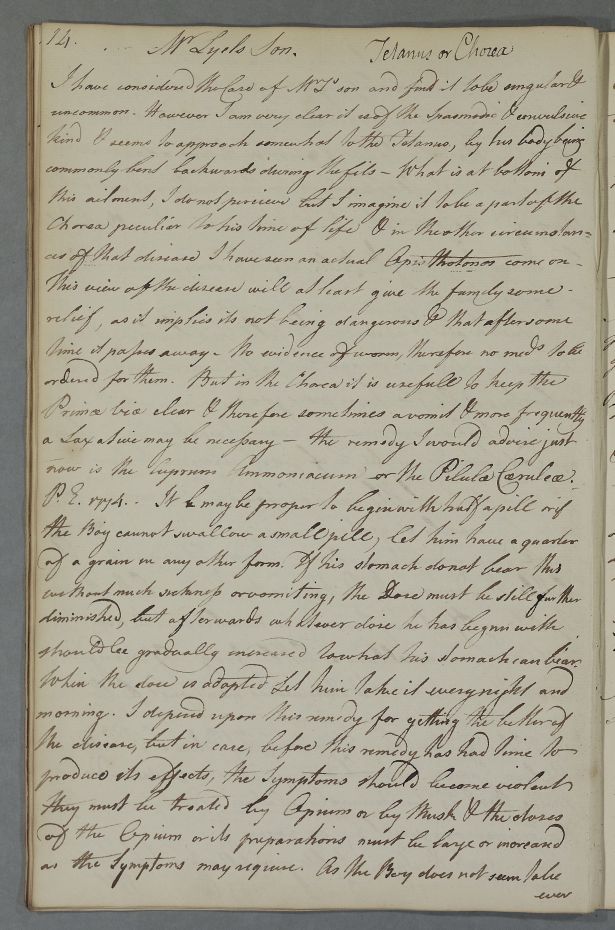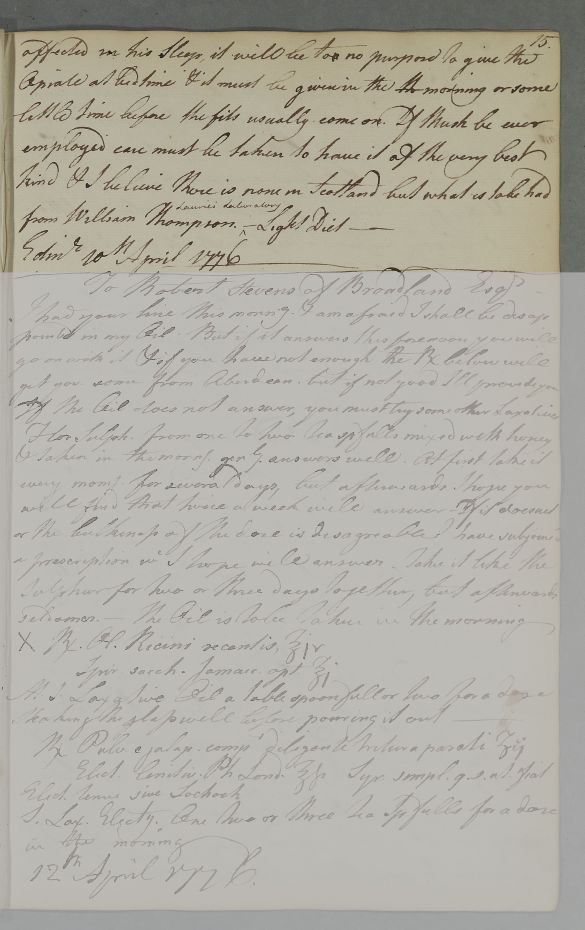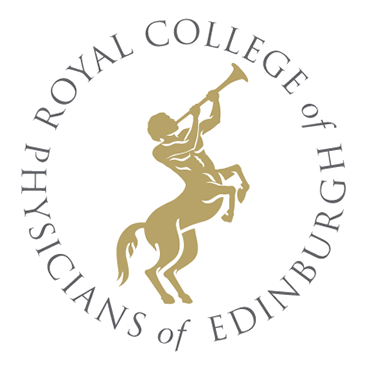
The Consultation Letters of Dr William Cullen (1710-1790) at the Royal College of Physicians of Edinburgh
[ID:3796] From: Dr William Cullen (Professor Cullen) / To: Stewart Lyell / Regarding: Lyell (Patient) / 10 April 1776 / (Outgoing)
Reply, 'Mr Lyels Son'
- Facsimile
- Normalized Text
- Diplomatic Text
- Metadata
- Case
- People
- Places
Facsimile
There are 2 images for this document.

[Page 1]

[Page 2]
Metadata
| Field | Data |
|---|---|
| DOC ID | 3796 |
| RCPE Catalogue Number | CUL/1/1/7/17 |
| Main Language | English |
| Document Direction | Outgoing |
| Date | 10 April 1776 |
| Annotation | None |
| Type | Scribal copy ( includes Casebook Entry) |
| Enclosure(s) | No enclosure(s) |
| Autopsy | No |
| Recipe | No |
| Regimen | No |
| Letter of Introduction | No |
| Case Note | No |
| Summary | Reply, 'Mr Lyels Son' |
| Manuscript Incomplete? | No |
| Evidence of Commercial Posting | No |
Case
Cases that this document belongs to:
| Case ID | Description | Num Docs |
|---|---|---|
| [Case ID:759] |
Case of the twelve year old son of Mr Lyel [Lyell] who suffers from convulsive fits. |
2 |
People linked to this document
| Person ID | Role in document | Person |
|---|---|---|
| [PERS ID:1] | Author | Dr William Cullen (Professor Cullen) |
| [PERS ID:584] | Addressee | Stewart Lyell |
| [PERS ID:585] | Patient | Lyell |
| [PERS ID:1] | Patient's Physician / Surgeon / Apothecary | Dr William Cullen (Professor Cullen) |
| [PERS ID:584] | Patient's Relative / Spouse / Friend | Stewart Lyell |
| [PERS ID:1745] | Other | William Thompson |
Places linked to this document
| Role in document | Specific Place | Settlements / Areas | Region | Country | Global Region | Confidence |
|---|---|---|---|---|---|---|
| Place of Writing | Cullen's House / Mint Close | Edinburgh | Edinburgh and East | Scotland | Europe | certain |
| Destination of Letter | Arbroath | East Highlands | Scotland | Europe | inferred |
Normalized Text
Mr Lyels Son
I have considered the Case of Mr Ls son and find it to be singular &
uncommon. However I am very clear it is of the Spasmodic & convulsive
kind & seems to approach somewhat to the Tetanus, by his body being
commonly bent backwards during the fits - What is at bottom of
this ailment, I do not percieve but I imagine it to be a part of the
Chorea peculiar to his time of life & in the other circumstan¬
ces of that disease I have seen an actual Opisthotonous come on.
This view of the disease will at least give the family some
relief, as it implies its not being dangerous & that after some
time it passes away. No evidence of worms, therefore no medicines to be
ordered for them. But in the Chorea it is usefull to keep the
Primae viae clear and therefore sometimes a vomit & more frequently
a Laxative may be necessary - the remedy I would advise just
now is the Cuprum Ammoniacum or the Pilula Caeruleae
Pharmacopoeia Edimburgensis 1774. It be may be proper to begin with half a pill or if
the Boy cannot swallow a small pill, let him have a quarter
of a grain in any other form. If his stomach do not bear this
without much sickness or vomiting; the Dose must be still further
diminished, but afterwards whatever dose he has begun with
should be gradually increased to what his stomach can bear.
When the dose is adapted Let him take it every night and
morning. I depend upon this remedy for getting the better of
the disease, but in case, before this remedy has had time to
produce its effects, the Symptoms should become violent
they must be treated by Opium or by Musk & the doses
of the Opium or its preparations must be large or increased
as the Symptoms may require. As the Boy does not seem to be ever
[Page 2]
affected in his Sleep, it will be too no purpose to give the
Opiate at bedtime & it must be given in the th morning or some
little time before the fits usually come on. If Musk be ever
employed care must be taken to have it of the very best
kind & I believe there is none in Scotland but what is to be had
from William Thompson ↑Laurie's Laboratory↑. - Light Diet -
Diplomatic Text
Mr Lyels Son
I have considered the Case of Mr Ls son and find it to be singular &
uncommon. However I am very clear it is of the Spasmodic & convulsive
kind & seems to approach somewhat to the Tetanus, by his body being
commonly bent backwards during the fits - What is at bottom of
this ailment, I do not percieve but I imagine it to be a part of the
Chorea peculiar to his time of life & in the other circumstan¬
ces of that disease I have seen an actual Opisthotonous come on.
This view of the disease will at least give the family some
relief, as it implies its not being dangerous & that after some
time it passes away. No evidence of worms, therefore no meds to be
ordered for them. But in the Chorea it is usefull to keep the
Primae viae clear and therefore sometimes a vomit & more frequently
a Laxative may be necessary - the remedy I would advise just
now is the Cuprum Ammoniacum or the Pilula Caeruleae
P. E. 1774. It be may be proper to begin with half a pill or if
the Boy cannot swallow a small pill, let him have a quarter
of a grain in any other form. If his stomach do not bear this
without much sickness or vomiting; the Dose must be still further
diminished, but afterwards whatever dose he has begun with
should be gradually increased to what his stomach can bear.
When the dose is adapted Let him take it every night and
morning. I depend upon this remedy for getting the better of
the disease, but in case, before this remedy has had time to
produce its effects, the Symptoms should become violent
they must be treated by Opium or by Musk & the doses
of the Opium or its preparations must be large or increased
as the Symptoms may require. As the Boy does not seem to be ever
[Page 2]
affected in his Sleep, it will be too no purpose to give the
Opiate at bedtime & it must be given in the th morning or some
little time before the fits usually come on. If Musk be ever
employed care must be taken to have it of the very best
kind & I believe there is none in Scotland but what is to be had
from William Thompson ↑Laurie's Laboratory↑. - Light Diet -
XML
XML file not yet available.
Feedback
Send us specfic feeback about this document [DOC ID:3796]
Please note that the Cullen Project team have now disbanded but your comments will be logged in our system and we will look at them one day...


